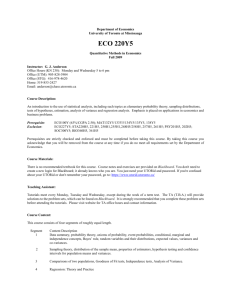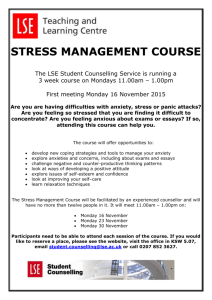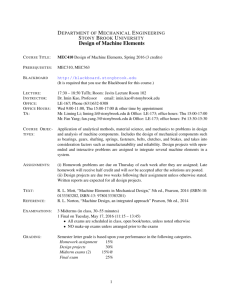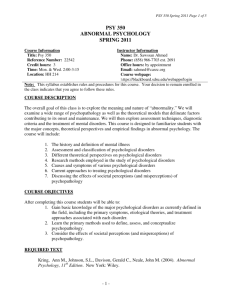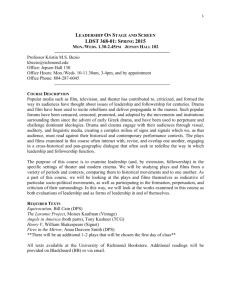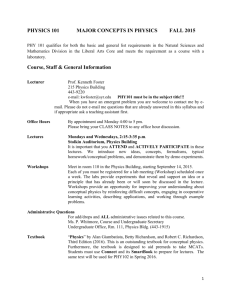Undergraduate Syllabus, Psychology, Xu
advertisement
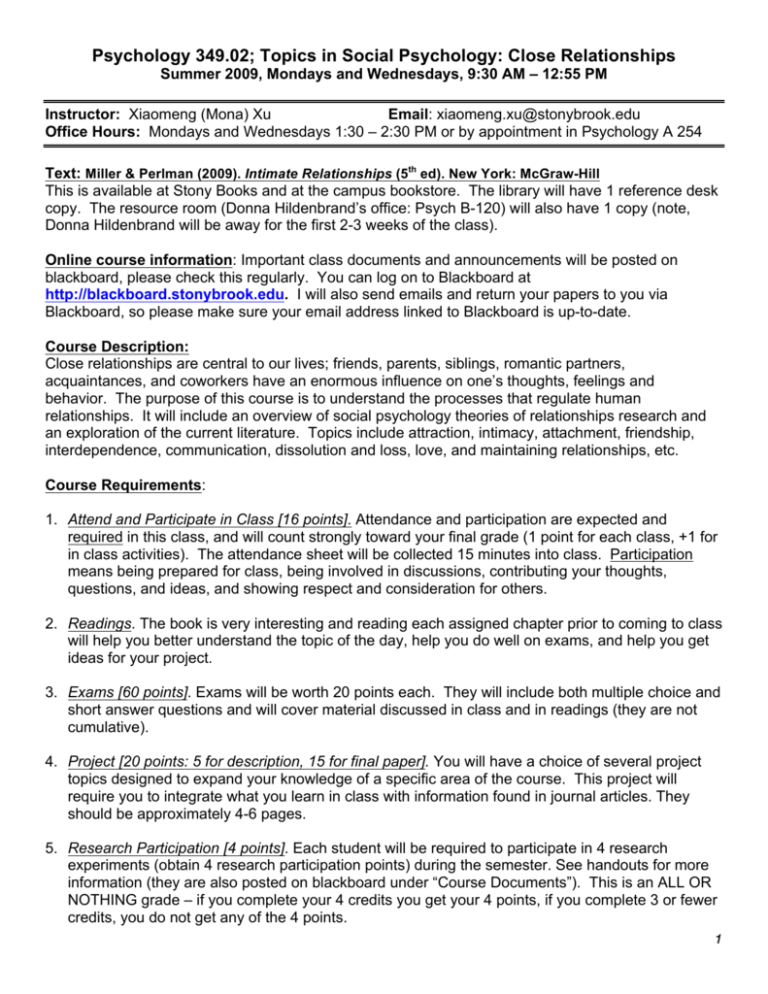
Psychology 349.02; Topics in Social Psychology: Close Relationships Summer 2009, Mondays and Wednesdays, 9:30 AM – 12:55 PM Instructor: Xiaomeng (Mona) Xu Email: xiaomeng.xu@stonybrook.edu Office Hours: Mondays and Wednesdays 1:30 – 2:30 PM or by appointment in Psychology A 254 Text: Miller & Perlman (2009). Intimate Relationships (5th ed). New York: McGraw-Hill This is available at Stony Books and at the campus bookstore. The library will have 1 reference desk copy. The resource room (Donna Hildenbrand’s office: Psych B-120) will also have 1 copy (note, Donna Hildenbrand will be away for the first 2-3 weeks of the class). Online course information: Important class documents and announcements will be posted on blackboard, please check this regularly. You can log on to Blackboard at http://blackboard.stonybrook.edu. I will also send emails and return your papers to you via Blackboard, so please make sure your email address linked to Blackboard is up-to-date. Course Description: Close relationships are central to our lives; friends, parents, siblings, romantic partners, acquaintances, and coworkers have an enormous influence on one’s thoughts, feelings and behavior. The purpose of this course is to understand the processes that regulate human relationships. It will include an overview of social psychology theories of relationships research and an exploration of the current literature. Topics include attraction, intimacy, attachment, friendship, interdependence, communication, dissolution and loss, love, and maintaining relationships, etc. Course Requirements: 1. Attend and Participate in Class [16 points]. Attendance and participation are expected and required in this class, and will count strongly toward your final grade (1 point for each class, +1 for in class activities). The attendance sheet will be collected 15 minutes into class. Participation means being prepared for class, being involved in discussions, contributing your thoughts, questions, and ideas, and showing respect and consideration for others. 2. Readings. The book is very interesting and reading each assigned chapter prior to coming to class will help you better understand the topic of the day, help you do well on exams, and help you get ideas for your project. 3. Exams [60 points]. Exams will be worth 20 points each. They will include both multiple choice and short answer questions and will cover material discussed in class and in readings (they are not cumulative). 4. Project [20 points: 5 for description, 15 for final paper]. You will have a choice of several project topics designed to expand your knowledge of a specific area of the course. This project will require you to integrate what you learn in class with information found in journal articles. They should be approximately 4-6 pages. 5. Research Participation [4 points]. Each student will be required to participate in 4 research experiments (obtain 4 research participation points) during the semester. See handouts for more information (they are also posted on blackboard under “Course Documents”). This is an ALL OR NOTHING grade – if you complete your 4 credits you get your 4 points, if you complete 3 or fewer credits, you do not get any of the 4 points. 1 Grading: 1. Participation: 1 point per regular day, +1 for activities (16 points total) 2. Exams (total of 3): 20 points each (60 points total) 3. Project: 20 points (choose from list) (20 points total) (5 for description, 15 for paper) 4. Research Participation (total of 4 credits) (4 points total) 100 points Letter Grade A AB+ B BC+ = = = = = = = Score 93-100 90-92 87-89 83-86 80-82 77-79 Letter Grade C CD+ D F = = = = = = Score 73-76 70-72 67-69 60-66 <60 Policies: Grading and Appeals Policy: 1. Points will be earned through a combination of exams, one project, in-class participation, and research participation. 2. I would be happy to meet with you to discuss exam grades, project grades, etc. If you have questions about an exam grade, please see me before the next exam. Discussion of your grades should be during office hours (not in class). 3. If you believe I have committed a grading error, please describe it in writing. 4. Special Circumstances: If you experience a major unexpected event that you anticipate will negatively impact your class performance, please detail the situation in writing as soon as possible and provide me with appropriate documentation. Absences: If you anticipate missing class, please let me know well in advance. You must also provide a letter signed by your coach/employer/doctor/etc. Absences without proper documentation will have a negative impact on your grade. • If an emergency or illness prevents you from attending class, please let me know ASAP in writing and provide documentation. • We will be covering a lot of material each class, so I strongly encourage you to come to every class. Late Projects: Project topic and the project itself must be submitted by 9AM on the due date via Blackboard (SafeAssign). I will not accept any other format (e.g. do not slip it under my door/in my mailbox). 1 point of the total Project grade will automatically be subtracted for every 24-hour period, starting from 9AM of the due-date, that the project topic or the project itself is not handed in. E-mail: Check your e-mail regularly, as I may use it to contact you about assignment or syllabus changes, etc. Please feel free to contact me via e-mail – be sure to include a subject and your full name. I will respond to e-mails at my earliest convenience (try to give me 48 hours if possible), but please do not e-mail me at the last minute expecting a quick reply. 2 Writing Assistance: The Writing Center on campus is available to all students for additional help with their writing skills. Find hours of availability and additional information at: http://stonybrook.edu/writrhet/writingcenter.shtml or call them at (631) 632–7405. Special Needs (Americans with Disabilities Act): If you have a physical, psychological, medical or learning disability that may impact your course work, please contact Disability Support Services, ECC (Educational Communications Center), room 128, (631) 632-6748/TDD. Their staff will determine with you what accommodations are necessary and appropriate. All information and documentation is confidential. Students who require assistance during emergency evacuation are encouraged to discuss their needs with their professors and Disability Support Services. For procedures and information go to the following website: http://www.ehs.sunysb.edu and search Fire Safety and Evacuation and Disabilities. Academic Integrity: Each student must pursue his or her academic goals honestly and be personally accountable for all submitted work. Representing another person's work as your own is always wrong. Any suspected instance of academic dishonesty will be reported to the Academic Judiciary. For more comprehensive information on academic integrity, including categories of academic dishonesty, please refer to the academic judiciary website at http://www.stonybrook.edu/uaa/academicjudiciary/ 3 Course Calendar (Subject to revisions, as needed) Topic Date Monday 7/13 The Building Blocks of Relationship Science: Class 1 course overview and methods of studying Assignment Due Today Chapters 1 and 2 relationships Wednesday 7/15 First Impressions: initial attraction, falling in love, Chapter 3 Class 2 and rejection Monday 7/20 Developing Close Relationships: self-disclosure, Think about project topic Class 3 intimacy, and perceived partner responsiveness (to discuss in class) Wednesday 7/22 Developing Close Relationships: closeness and Chapter 6 Class 4 interdependence, and types of relationships Project Description Due Monday 7/27 Social Cognition in Ongoing Relationships: Exam 1 (1st half of class) Class 5 idealization, implicit theories, and biases Chapter 4 Wednesday 7/29 Communication and Friendship: non-verbal Class 6 behavior, friendship across the life-cycle Monday 8/3 Theoretical Perspectives: Attachment and Class 7 Evolution: the influence of individual and biological Chapters 5 and 7 Project Due differences on relationships Wednesday 8/5 Negative Emotions in Relationships and Conflict in Chapters 10, 11, and 12 Class 8 Relationships : jealousy, loneliness, and power Monday 8/10 Dissolution and Loss: dissatisfaction and divorce, Exam 2 (1st half of class) Class 9 conflict, and forgiveness Chapter 13 Wednesday 8/12 Maintaining Relationships: willingness to sacrifice, Class 10 accommodation, and satisfaction over time Monday 8/17 Positive Emotion in Relationships: love and social Class 11 support Chapter 14 Chapter 8 Wednesday 8/19 Exam 3 Remember – you must Class 12 have completed your research credits by today 4 Choose Your Own Project (20 Points; Due Monday 8/3) • Because each student enjoys, and benefits educationally, from different types of learning opportunities you will have the chance to choose your main project for this course. • As you can see, each project involves the combination of class material, research articles, and application concepts to everyday experience. • When choosing your project, I would consider the project that you believe you will learn the most from and enjoy the most. • A brief description of each project is listed below. • Projects should be approximately 4-6 pages. Don’t forget to cite using APA style! (the best source to guide you with APA style is the APA Publication Manual, which the library has several copies of available at the reference desk. The Resource Room, Psych A-120, also has a copy. I also have a copy you can look at during office hours). Popular Press Vs. Research– You will compare relationship advice that appears in a popular source (e.g. popular magazine) with actual research (in addition to material from the book and class you will need to use a minimum of 5 academic journal articles) on the same topic. Your job will be to determine the accuracy of the popular source and suggest ways more actual research findings could have been included or more accurately portrayed. Create Your Own “How-to” Guide – This project will require you to synthesize a body of relationship literature (in addition to material from the book/class you will need to use a minimum of 5 academic journal articles) and provide a practical guide that would be suitable for publication in a popular press source. Some possibilities include: How to Optimize Attraction, How to Improve Your Relationship Quality, How to Cope Following Break-Up, How to Maintain Friendships etc. Literature Review and Research Proposal– For this project you will choose an area of the relationship literature to review. This will involve reviewing, critiquing, and synthesizing a combination of 5 theoretical and empirical academic journal articles. Finally, you will propose 3 possible directions research in this area should go, including key hypotheses and justification (e.g. why would you expect this) for each suggestion. This is a great option for those doing an Honors Project or considering going to graduate school. Evaluation of Your Own Relationship – Using a current (or very recent relationship) that has lasted more than 1 month; apply a minimum of 7 concepts/theories that apply to that relationship. For each concept you will be expected to explain the concept in your own words based on content from the course (in addition to material from the book/class you will need to use a minimum of 5 academic journal articles), then apply the concept specifically to your experiences (does course info match with your experience?), and highlight what you have learned (how can this info help your relationship?). You should be sure to discuss several different topics within relationship theory (e.g. don’t just focus on attraction or love). Remember – this does not have to be a romantic relationship, it could be a friendship, familial relationship etc. If you choose this option, please remember that even though this is about your personal experience, the project should be written up objectively, and based on the 7 concepts/theories and the minimum of 5 academic journal articles that you use. Do not give more information than is necessary (e.g. this is not a memoir of every detail of the relationship). I highly recommend that you do NOT choose this option if you think you will end up focusing on a relationship that is negative or that ended badly (this project should not make you upset!) 5
